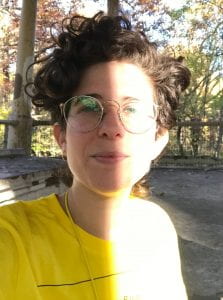 Vered Engelhard is a Peruvian artist and scholar based in New York. Their work is centered in radical ecologies and dissident sensorialities. Engelhard has performed in venues such as National Sawdust, Areté Gallery, the Segal Theatre, Columbia University, Human Impact Institute, Museo de Arte de Lima, among others. Their writing has been published in Kunstmuzik, Columbia Law Blog, Asymptote, Brooklyn Rail, Museo de Arte de Lima, Museu de Arte de São Paulo Assis Chateaubriand, among others. They have participated in residencies at Mildred’s Lane, Works on Water at Governors Island, the Interdisciplinary Art and Theory Program, and soon the Watermill Center. They are a Ph.D. student and Teaching Fellow in the Latin American and Iberian Cultures department at Columbia University.
Vered Engelhard is a Peruvian artist and scholar based in New York. Their work is centered in radical ecologies and dissident sensorialities. Engelhard has performed in venues such as National Sawdust, Areté Gallery, the Segal Theatre, Columbia University, Human Impact Institute, Museo de Arte de Lima, among others. Their writing has been published in Kunstmuzik, Columbia Law Blog, Asymptote, Brooklyn Rail, Museo de Arte de Lima, Museu de Arte de São Paulo Assis Chateaubriand, among others. They have participated in residencies at Mildred’s Lane, Works on Water at Governors Island, the Interdisciplinary Art and Theory Program, and soon the Watermill Center. They are a Ph.D. student and Teaching Fellow in the Latin American and Iberian Cultures department at Columbia University.
Concept: Transition
Transgender bodies are a challenge to the Marxist concept of transition. Considering us requires a genealogical reorientation of the concept that drastically alters its structural operations. My presentation ponders the role of gender transition in a rethinking of transition between processes of production, state policies of reproduction, and of reproduction in general. In line with feminist interventions, I trace the place of transgender folk in Peru in dialogue with the responses from the Peruvian government to COVID-19. In an articulation of a trans-Marxist theory of transition I ask: How is it productive to think of this time less in terms of crisis than in terms of transition? My proposal is that, if we analyze the development of the pandemic from the positionality of trans bodies (with the inequalities and differences that exist between people who fall under this category), it becomes clearer that what we are living through is indeed a transition. Moreover, the hope is that a feminist analysis of transition can orient us towards the significance of thinking through a transition while still living within it, flagging its potentialities in the form of political strategies as always aligned with our ever-changing perceptual limits.